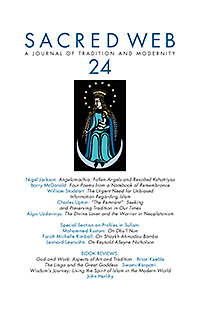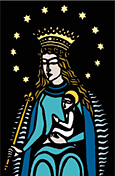Sacred Web 24
Editorial: Of “Longing” and “Belonging"
by M. Ali Lakhani
Rooted in the metaphysical principle that everything “belongs to God”, this essay is a profound meditation on the relationship between “longing”—the need for requital—and “belonging”—the grace of requital.
The Urgent Need for Unbiased Information Regarding Islam
by William Stoddart
At the heart of Islam is its pluralistic message of tolerance, enshrined in an ethic of compassion. Yet sadly the “image of Islam” is the exact opposite. Dr. Stoddart’s essay is an attempt to “set the record straight” by an examination of Islam’s historical record in areas such as tolerance of other faiths, and its treatment of women. The author also contrasts Islam with other faith traditions, emphasizing that the abuses carried out in the name of a religion needs to be distinguished from the central message and ethos of the faith.
The Remnant
by Charles Upton
Those who are familiar with Upton’s writings will be aware of his preoccupation with the urgent question for our times: how are we to live in these “Latter Days” of the “Kali Yuga”? Drawing on the Biblical image of the “Remnant” to describe what remains of the sacred Tradition in our times, Upton explores whether and how we can avoid the “worldly sterility” that threatens to obscure our spiritual patrimony. He focuses on the questions of “how to seek the Remnant” and “how to be the Remnant”, reminding us that our task is to feed that which is worldly within us to the “World-Devourer”, and he also considers what it means “to be in the world but not of it” and touches upon the pitfalls of pride and error in solitary and communal worship.
The Divine Lover and the Warrior in Neoplatonism
by Algis Uzdavinys
This essay explores the interesting theme that, in metaphysics, Love and Strife cannot be regarded simplistically as opposites of each other; they also contain an inner (complementary) polarity, whereby Love can represent profane desire while Strife can represent sacred struggle. Uzdavinys is a profound scholar of ancient Greek traditions, and he draws here on a wealth of examples to illustrate how the ancient myths and teachings of the Neoplatonic tradition are a guide to the theurgic and ontological realignment of souls that is the métier of man.
Angelomachia: Fallen Angels and Revolted Kshatriyas
by Nigel Jackson
This essay explores certain aspects of mythic symbolism relating to the ‘Revolt of the Kshatriya’ against the authority of the Brahminic sacerdotal caste and the consequent rupture between the functions of contemplative Wisdom and temporal Power, specifically examining these concepts in the light of the Biblical motif of the fall of the apostate angels. These themes are unfolded as a means of understanding the origins of the spiritual inversion which becomes increasingly apparent in the modern epoch and characterizes its mindset, comprehended as manifestations stemming from a momentous disruption occurring within the primordial and human order. The usurpation of spiritual authority by temporal power becomes the point of departure for considerations which bear upon both the eclipse of the traditional world-conception and the metaphysical implications which these issues present in respect of the inner life of the contemporary individual.
Four Poems from a Notebook of Remembrance
by Barry McDonald
These new poems from Barry McDonald are titled “The Icon”, “The Bond”, “Winter Stars”, and “No Other Word”.
Special Section on Profiles in Sufism:
The Sufi Teachings of Dhu’l-Nun
by Mohammed Rustom
Drawing on some of the best-known Arabic writings of the Islamic mystical tradition from the 4th/10th to the 6th/12th centuries, this piece offers a thematic presentation of the teachings of the influential early Sufi figure, Dhu’l-Nun al-Misri (d. 245/859 or 248/861).
The Pen and the Canon:
Shaykh Ahmadou Bamba’s Nonviolent Jihad
by Farah Michelle Kimball
Shaykh Ahmadou Bamba (1854-1927) of Senegal is the founder of a major Sufi Order (the Muridiyyah Order) and of the city of Touba, where he is buried. Like the Algerian, Shaykh Emir Abd al-Qadir, to whom he is compared in this article, Bamba received a medal of honor from the French, and both men are major figures in African Sufism, with an influential body of writings. But unlike Abd al-Qadir who promoted both the greater and lesser jihad, Bamba was a pacifist who opted for the greater jihad of non-violent resistance based on noble humanistic principles, derived from the Qur’an, which remain relevant in our times. Read more...
A Profile of Reynold Alleyne Nicholson (1868–1945)
by Leonard Lewisohn
This article, by a specialist in Persian and Sufi literature, profiles the life and work of one of the most influential “orientalist” scholars, renowned as an authority on Rumi and especially for his magisterial translation of Rumi’s “Mathnavi”.
Book Reviews:
God and Work: Aspects of Art and Tradition
By Brian Keeble
Reviewed by M. Ali Lakhani
The Linga and the Great Goddess
By Swami Karpatri
Reviewed by Renaud Fabbri
Wisdom’s Journey:
Living the Spirit of Islam in the Modern World
By John Herlihy
Reviewed by Samuel Bendeck Sotillos
Notes on Contributors




